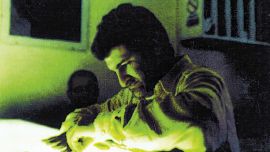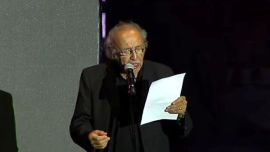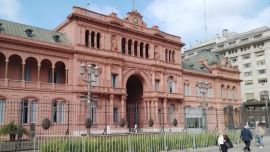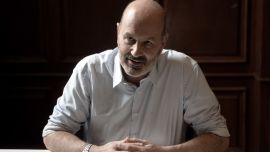Javier Milei is certainly not the first Argentine president to tell the world’s plutocrats they would be well-advised to invest a few hundred billion dollars in his country because it could soon enjoy an epoch-making economic boom. For over a century, most occupants of the Pink House have boasted about Argentina’s enviable natural advantages: countless acres of prime farmland, gas despots, oil there for the taking, minerals galore, freedom from racial conflicts and remoteness from predatory military powers.
All this would be wonderfully convincing were it not for the country’s dismal record. Over the years, corruption, a tradition of pedantic legalism combined with contempt for the law, and crass political ineptitude, have made such a generously endowed land a basket case which in financial circles is famous for defaulting on the gigantic debts its rulers are so good at running up.
It is therefore understandable that many have reacted with scepticism towards Milei’s promise that Argentina will become “the Rome of the 21st century” and – mixing his metaphors rather strangely for such a fervent Judeophile – “the new Mecca of the West”; in everyday Spanish, that city has long had a figurative meaning it lacks in English. To those who in the past placed their bets on Argentina and lost a great deal of money as a result, his spiel must have sounded like something a confidence trickster might say.
Before risking their own savings, those of their clients or their personal reputations, the stupendously rich people Milei is courting will need hard evidence that under his stewardship Argentina is really ready to change back into the Latin American tiger she once was. So far, the signs are quite promising, what with the IMF folk saying they are amazed by what he has managed to do in the last few months, but these are still early days. For Milei to win and transform Argentina into the “next Rome,” by which he appears to mean the capital of a great free-market empire, the economy would have to spring back to life after leaving the operating theatre in which it is now lying. To do this, he will need to get onside more parts of the political class he delights in treating as a bunch of thieving rodents,
Though Milei looks weak because he has little support in Congress and is being besieged by the trade unions plus an army of social-justice warriors who for many years have owned the streets, he has mastered the art of turning weakness into strength. He behaves like a political judoka who positively wants his foes to charge wildly against him not just because he thinks it will be easy for him to trip them up, but also because he knows it will help shore up the support he enjoys among much of the middle class and an increasing number of people whose incomes barely keep them alive. That is why he and his aides are doing their best to make out that they welcome the general strikes organised by the thoroughly discredited trade union bosses in an effort to stop the libertarian government in its tracks and clink glasses when Cristina Fernández de Kirchner, Alberto Fernández and Axel Kiciloff hurl insults their way.
Milei got to where he is thanks almost entirely to the follies of what he calls the “political caste.” Had the Kirchnerites governed Argentina in a reasonable manner and leading members of the PRO-Radical coalition spent less time squabbling noisily among themselves, he would have remained a loud-mouthed talking head with nutty beliefs who could be relied on to enliven television programmes by making outrageous statements. Having learned that it is to his advantage to let his opponents shoot themselves in the foot – something they do whenever they threaten to harass legislators who vote for his parliamentary bills or stage mass demos demanding more hand-outs – he continues to take pleasure in taunting them.
Milei and his fellow-libertarians have the Executive branch in the bag, but they arrived on the scene too late to get that many legislators. The Chamber of Deputies and the Senate reflect the political realities of a year or more ago. Milei hopes to remedy this in the next few years when, he confidently assumes, he will have done enough to convince voters that the party that came into being in order to make the most of his increasing popularity is not just a jumble of true believers and opportunities but a serious outfit destined to play a role comparable to those of first the Unión Cívica Radical and then the Justicialist (Peronist) Party.
This possibility may still seem far-fetched, but it worries not only the Peronist and Radical defenders of the old “populist” regime but also leaders of Mauricio Macri’s PRO who, by and large, approve of Milei’s initiative even those they dislike his often obnoxious personal style. Until quite recently, they imagined they could take over Milei’s party by providing it with the hundreds of experienced and presumably competent operatives it would need to fill key posts in the governmental bureaucracy but, as was bound to happen, the men and women who had jumped onto the tousle-haired, chainsaw-wielding economist’s bandwagon when it was getting started do not like the idea. They are fighting to hold onto the positions that they think they deserve against Macri and other intruders, letting them know that, to be accepted, they would have to subordinate themselves to those who currently occupy the top slots.
In addition to the Presidency, which in Argentina is in theory an almost monarchical institution and certainly gives him a bully pulpit, Milei has the support of about half the population and, surprising as it may seem, a considerable international reputation. He is widely considered a star of the “new right” because he is a fervent defender of Western civilisation which he fears is being undermined by leftists who are willing to make common cause with its Chinese and Islamist enemies. However, unlike the many in Europe who share such views, he sees businessmen who do not depend on political favours as true heroes whose contribution to material progress far exceeds that of anyone else, an approach that, for understandable reasons, does not go down at all well with academics and others who are convinced that they are leading humanity to wherever it is going and that, with few exceptions, businessmen are greedy grifters who need to be kept in their place.



















Comments